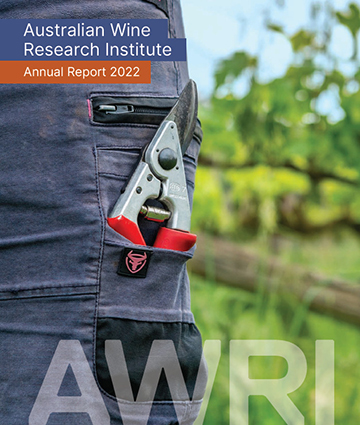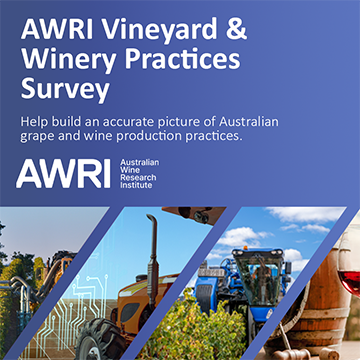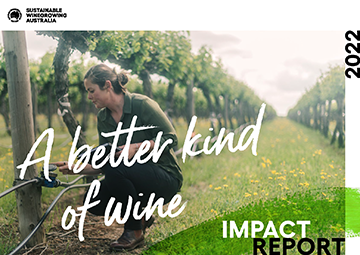Update on Wine Australia-funded impact project development
First look at Practices Survey results
Affinity Labs sample pick-up service launching in Murray Darling
Wine Australia sustainability survey now open
Non-chemical weed control: history and current resources
Sustainable Winegrowing Australia, FY22 Impact Report – coming soon!
Order the latest AWRI publications online
AWRI Annual Report available |
|
 |
The 2022 AWRI Annual Report was sent out to levy payers in December and is also now available from the AWRI website. This year’s report includes updates on research, development and extension projects; highlights from the year; financial statements; and summaries of a wide range of activities. Visit our Annual Reports page to access the latest report and find previous years’ reports, dating back to 1999! |
Update on Wine Australia-funded impact project developmentOver recent months the AWRI and Wine Australia have been working together closely on a process for co-designing ‘impact’ projects under three themes:
This has involved facilitated workshops and detailed conversations with industry members in roles across the value chain. A range of initiatives are now being developed for assessment and prioritisation. This new process will deliver outcomes for which the target audience for innovation is clearer and the associated opportunities and barriers are better understood, all of which will translate into a greater direct impact on our industry’s sustainability and profitability. The impact project teams at the AWRI would like to thank all industry members who have taken part in conversations supporting this process, and are excited about continuing to work closely with industry partners in the future. Updates on the initiatives under development will be provided in future issues of AWRI eNews. |
|
First look at Practices Survey results |
|
 |
Late last year Simon Nordestgaard presented a webinar with some early results from the AWRI Vineyard & Winery Practices Survey. Drawing on responses from one of the key questions in the survey, the webinar discussed the products and equipment nominated by Australian grapegrowers and winemakers as having had the biggest positive impact on their operations over the last six years. If you missed it in the December rush, you can watch the recording now. More results from the survey will be released later in the year. |
Affinity Labs sample pick-up service launching in Murray DarlingAffinity Labs is offering a new flow cytometry-based method known as BrettCount for detecting viable Brettanomyces cells in wine. This method uses a mixture of fluorescent gene probes targeting different regions of the 16s ribosomal RNA of Brettanomyces cells to rapidly detect and quantify them in wine. The method has high specificity and does not cross react with other species that may be present in wine. The limit of detection is 100 cells/mL. Only viable cells are detected, although some cells that are not culturable under laboratory conditions can also be detected. BrettCount is rapid, with results obtained within one day. A recent comparative study showed that BrettCount correlates better with the ‘gold standard’ selective plating method than other rapid methods. For more information or to submit samples for BrettCount analysis, contact customerservice@affinitylabs.com.au. |
|
Wine Australia sustainability survey now openWine Australia is currently seeking input to assist with the development of an Environmental, Social and Governance (ESG) Business Plan for the Australian grape and wine sector via a short survey. While the terminology of ‘ESG’ may be new to some, it relates to the sustainability of the planet, people and profit (or prosperity). Globally, there are increasing market pressures to provide sustainability credentials or increased reporting and proof of business processes relating to environmental, social and governance measures. To ensure that Australian grape and wine businesses of all sizes are well positioned to respond to this fast-evolving landscape, you are encouraged to participate in the survey to share the challenges and opportunities your business is facing. The survey is open until 3 February 2023 and can be accessed here. |
|
Non-chemical weed control: history and current resourcesIn recent years Australian grapegrowers have shown increasing interest in trialling and adopting non-chemical techniques for controlling weeds in vineyards. The AWRI’s non-chemical weed management webpage contains a range of resources relevant to this topic, including an online tool to help growers choose the best option(s) for their situation and a recently published article on the development of undervine weeding equipment. To discuss weed control options or any other technical viticulture or winemaking topic, contact the AWRI helpdesk on helpdesk@awri.com.au. |
|
Sustainable Winegrowing Australia, FY22 Impact Report – coming soon! |
|
 |
Keep your eyes out for the upcoming Sustainable Winegrowing Australia Impact Report which will be released in late February, supported by a media campaign from March. This report presents the national sustainability data of members from financial year 2022. It highlights the actions members are taking to reduce water and use alternative energy sources, decrease waste, improve soils, increase biodiversity and contribute to their communities. It also features several certified members and the difference they are making. The report will be made available on the Sustainable Winegrowing website by the end of February. In the meantime you can access the previous year’s Impact Report. |
Free access to eBooksDid you know that Australian grapegrowers and winemakers have free access to 250 viticulture and oenology eBooks from the AWRI library? eBooks can be read online or downloaded to your device to read offline. You can also print or save up to one chapter or 10% of the book. To explore the wide range of eBooks available, log into the library database using your AWRI website login. The AWRI Library adds new eBooks regularly and new purchase suggestions are welcome. Contact the library team on infoservices@awri.com.au to suggest a book or if you need any assistance with accessing the library database. Recently added eBooks on topics including flavour, soil, marketing, sustainability, pests, wine quality and analysis are listed below.
|
|
Order the latest AWRI publications onlineAccessing the latest AWRI publications is easy. Visit the AWRI Publications web page to:
The AWRI’s most recent publications are listed below. 2312 Cordingley, B., Coulter, A., Cowey, G., Dixon, R., Essling, M., Holdstock, M., Longbottom, M., Penfold, C., Pitcher, L., Schwarz, C., Simos, C., Krstic, M. 2022. Vintage 2022 – observations from the AWRI helpdesk. Wine Vitic. J. 37(4): 36-38. 2313 Corsi, A.M., Dolan, R., Goodman, S., Pearson, W. 2022. Exploring the attitudes and expectations of Australian drinkers and non-drinkers towards low and no-alcohol wines. Wine Vitic. J. 37(4): 70-72. 2314 Dry, P., Smart, R. 2022. Varietal choice for a warmer future. Wine Vitic. J. 37(4): 54-61. 2315 Dry, P. 2022. Pecorino. Wine Vitic. J. 37(4): p. 67. 2316 Ismail, I., McKay, S., van den Heuvel, S., Borneman, A., Sosnowski, M. 2022. Evaluation of spore collection methods for detection and quantification of fungicide resistance in powdery mildew. Wine Vitic. J. 37(4): 46-52. 2317 Nordestgaard, S. 2022. History and recent developments in under-vine weeding equipment. Aust. N.Z. Grapegrower Winemaker (705): 50-61. 2318 Schwarz, C. 2022. Ask the AWRI: How’s the weather? Aust. N.Z. Grapegrower Winemaker (705): 50-61. 2319 Dixon, R., Cowey, G. 2022. Vineyard nitrogen management in a urea-limited world. Aust. N.Z. Grapegrower Winemaker (706): 54-55. 2320 Ntuli, R.G., Saltman, Y., Ponangi, R., Jeffery, D.W., Bindon, K., Wilkinson, K.L. 2022. Impact of skin contact time, oak and tannin addition on the chemical composition, color stability and sensory profile of Merlot wines made from flash détente treatment. Food Chem. 405: 134849. 2321 Mierczyński, P., Dawid, B., Mierczynska-Vasilev, A., Maniukiewicz, W., Witońska, I., Vasilev, K., Szynkowska-Jóźwik, M.I. 2022. Novel bimetallic 1%M-Fe/Al2O3-Cr2O3 (2:1) (M = Ru, Au, Pt, Pd) catalysts for Fischer-Tropsch synthesis. Catal. Commun. 172: 106559. https://doi.org/10.1016/j.catcom.2022.106559 2322 Jiang, W.W., Bilogrevic, E., Parker, M., Francis, I.L., Leske, P., Hayasaka, Y., Barter, S., Herderich, M. 2022. The effect of pre-veraison smoke exposure of grapes on phenolic compounds and smoky flavour in wine. Aust. J. Grape Wine Res. DOI: 10.1155/2022/9820204. 2323 Henschke, P., Borneman, A. 2022. Clonal mapping of Pinot Noir: Loss of source blocks in Adelaide Hills bushfires leads to clonal identification for Pinot Noir. Aust. N.Z. Grapegrower Winemaker (707): 35-37. 2324 Cowey, G., Schmidt, S. 2022. Ask the AWRI: Winery nutrient management in a DAP-limited world. Aust. N.Z. Grapegrower Winemaker (707): 46-47. 2325 Krstic, M. 2022. Australian Wine Research Institute: Annual Report 2022. Aust. N.Z. Grapegrower Winemaker (707): 76-79. 2326 Cordingley, B. 2023. Ask the AWRI: Thinking about pinking. Aust. N.Z. Grapegrower Winemaker (708): 46-47. |
|
AcknowledgementsThe AWRI acknowledges support from Wine Australia, with levies from Australia’s grapegrowers and winemakers and matching funds from the Australian Government. The AWRI is a member of the Wine Innovation Cluster in Adelaide, South Australia. |
|

